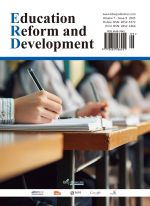Abstract
Against the backdrop of the rapid development of artificial intelligence technology, primary school mathematics education is undergoing profound structural changes. Based on the technology empowerment logic of artificial intelligence in the educational field, this paper systematically analyzes the main changes in primary school mathematics education in three aspects: teaching resources, classroom models and evaluation systems: first, the transformation of teaching resources from traditional paper to intelligent and diversified; second, the evolution of classroom teaching from “teacher-centered” to “student-centered” personalized interactive mode; third, the expansion of the evaluation system from terminal result evaluation to process-based, data-based, and multi-dimensional evaluation. In response to the current difficulties faced by teachers in adapting to the integration of technical literacy, teaching concepts and practices, this article proposes coping strategies such as improving information technology capabilities, building a personalized teaching system, establishing a scientific and reasonable multi-evaluation mechanism, and strengthening the combination of theory and practice, emphasizing the important support of inter-school cooperation and educational ecological synergy for the sustainable advancement of reform. This article aims to provide theoretical support and practical inspiration for the transformation of primary school mathematics education in the context of the artificial intelligence era, and to help improve education quality and modernize basic education.
References
Liu B, Zhu G, 2024, Educational Informationization Governance in the Intelligent Era: Theoretical Framework and Typical Application Practices. E-Education Research, 45(9): 5–13.
Zhang D, Wang H, Yuan J, et al., 2021, The Reform and Practice of Technology-Enabled Teaching Mode. China Educational Technology, 2021(4): 125–138.
Dong H, Lu L, 2024, The Governance Logic of Intelligent Reconstruction of Education Platform Driven by Digital New Quality Productive Forces. Journal of Henan Normal University (Philosophy and Social Sciences Edition), 51(6): 21–27.
Liu Z, 2020, Class Teaching Innovation in Colleges and Universities: The Reality, Essence and Realization. Journal of Higher Education, 41(7): 58–69.
Fan G, 2020, Reconstruction of the Educational Ecologies in the Post-Pandemic Era. Fudan Education Forum, 18(4): 12–28.
Xiang J, Chen P, 2023, Toward High Quality: Symptoms and Solutions to the Digital Transformation of the Teaching Force. China Educational Technology, 2023(9): 59–68 + 75.
Huang D, Lu J, 2025, Fostering Creativity of Primary and Secondary School Students through Teaching Innovation: A Meta-Analysis. Research in Educational Development, 45(4): 69–77.
Teng Y, Sun R, 2024, The Exploration of After-School Education in the Early Training of Innovative Talents in China. Journal of the Chinese Society of Education, 2024(7): 56–63.
Chen Y, Song H, 2024, Research on Strategies to Improve Rural Teachers’ Information Literacy in the Intelligent Era. Journal of Sichuan Vocational and Technical College, 34(5): 25–30.
Li S, Liao J, 2024, The Changes and Prospects of the Teaching Methods in New China’s Primary and Secondary Schools. Educational Research and Experiment, 2024(6): 83–92.
Zhao Y, Xu M, Zhao Z, 2023, The Practice Diagnosis and Optimization Methods of Informationized Innovation Class—The Analysis Based on 14th National Primary and Secondary School Innovation Classroom Teaching Videos. China Educational Technology, 2023(8): 102–111 + 118.
Mu S, Chen X, Zhou D, 2025, Generative Artificial Intelligence Empowers Instructional Design Analysis: Needs, Methods, and Prospects. Open Education Research, 31(1): 61–72.
Sun J, Liu X, 2024, On Teaching Practice of Process Assessment, Formative Assessment and Summative Assessment. Research in Higher Education of Engineering, 2024(4): 94–100.
Tian F, 2024, The Number of Wisdom: The Integration of Artificial Intelligence and Primary School Mathematics Teaching. Reading, Writing, and Computing, 2024(23): 71–73.
Li F, He Y, Wang T, 2021, Research on Construction and Exploration of Personalized Students Growth System Based on Intelligent Graphic Element Technology. Journal of Distance Education, 39(4): 42–51.
